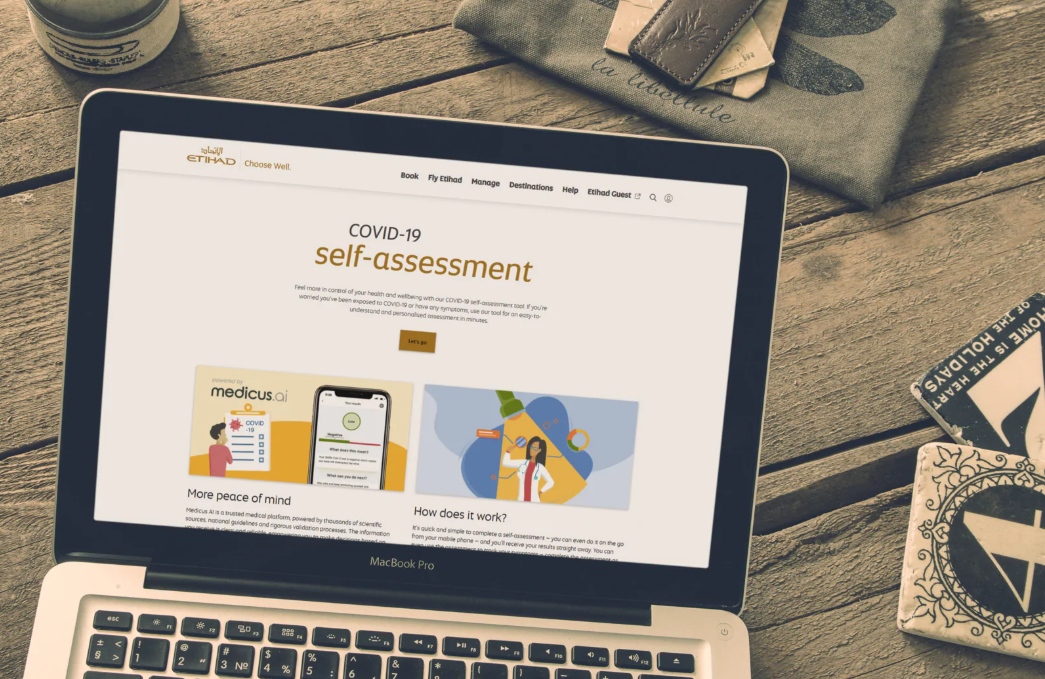
Five aviation industry suppliers have devised solutions aimed at mitigating the spread of COVID-19, including a risk-assessment app, an immunity “passport,” cabin air supply modifications and hands-free aircraft lavatories.
Abu Dhabi-based Etihad Airways has partnered with Austrian medical technology specialist Medicus AI to launch a COVID-19 risk-assessment tool. The digital tool, which will be available on Etihad’s website and app, poses 22 questions to assess a passenger’s probability of having COVID-19. The questions are based on World Health Organization (WHO) guidelines and take an estimated 5 min. to answer.
“With this risk-assessment tool, guests will understand their individual probability of having contracted the virus, alongside advisories and recommendations, allowing them to make informed decisions about traveling,” Etihad said, announcing the launch on June 22.
Separately, Israeli technology company Pangea is developing a COVID-19 immunity “passport.” Using its development, Pangea said national governments could issue biometric smart cards that are linked securely to countries’ medical databases, verifying individuals are virus-free, or have immunity. The cards would include chips containing encrypted data on their holders’ COVID-19 status plus photos, digital signatures and holograms.
“Pangea is in talks with several governments on the use of the smart card in their countries,” the company said in a statement.
For onboard technologies, design company Teague has developed a device called AirShield, which is designed to redirect cabin airflow to minimize potential infection.
“In an aircraft environment, it is airflow and not the distance that plays the most significant role in the spread of a virus. By engineering the cabin airflow to manage each individual’s exhalations, passengers can have far greater peace of mind,” Teague senior director of airline experience Anthony Harcup said.
The AirShield is a 3D-printed grill that fits over passenger overhead air vents. It is designed to control the spread of airborne droplets by immediately redirecting the airflow downward and into the aircraft’s high-efficiency particulate air (HEPA) filtration units.
“The simplicity of the design means that with just one grill per seat row, the 60 grills required to fit a narrow-body aircraft could be fitted overnight as a service bulletin,” Teague said.
The AirShield grill is in the early prototyping and development stages.
U.S.-based Collins Aerospace Systems has developed the first retrofit HEPA filter kit for de Havilland Dash 8-100s, -200s and -300s. Five Dash 8 operators already have ordered the Collins HEPA filter, which mounts with a prefilter inside an aluminum enclosure and is intended to trap 99.97% of harmful airborne particles.
“These HEPA filter kits are simple to install, improve cabin air purity and provide a more comfortable aircraft environment at a low replacement cost,” Collins Aerospace VP and general manager Trevor Skelly said. “While this specific solution is an exclusive drop-in replacement for Dash 8 operators, we’re ready and able to partner with airlines and operators of other platforms to help deliver a HEPA filtering solution to best fit their existing fleet, as well.”
HAECO Cabin Solutions has launched a series of hands-free aircraft lavatory upgrades. These comprise a foot-controlled toilet-flush switch, a waste bin that is opened by an infrared sensor and a hands-free refillable hand sanitizer dispenser.
“In our current environment and expectations for the future, passengers would greatly benefit from these enhancements to on-board sanitation. These devices are already familiar to consumers, and we can certify their use in aircraft for integration into the aircraft cabin,” HAECO Cabin Solutions president and group director Doug Rasmussen said.





